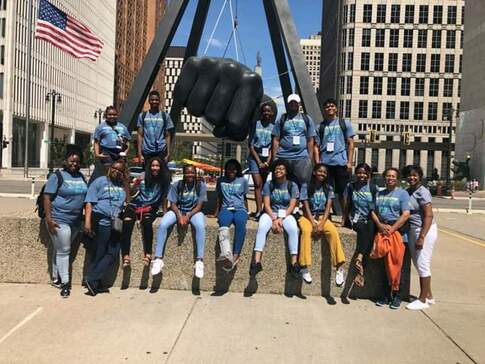|
This week, the Capital Area Progressive Democrats honored Austin NAACP President, Nelson Linder, with the Kick Ass Award.
The award ceremony will be held on October 7 at St. David’s Episcopal (301 E. 8th Street, 78701). There will be a cocktail hour at 5:00pm, and the dinner and program will start at 6:00pm.
1 Comment
The Texas Court of Appeals has ruled that the City of Austin must change the ballot language they used for November's 'unconventional' ordinance.
Opponents got the required number of signatures to put it on the ballot, giving voters a say when it comes to expanding the convention center. It's an unnecessary use of hotel tax revenue, according to opponents. Austin's NAACP President Nelson Linder sued the city claiming the ballot language doesn't accurately describe what the petition is about. Read more here. In a sharp rebuke to the Austin City Council, the 3rd Court of Appeals ruled Thursday that the council abused its power in writing misleading ballot language for the upcoming election related to the expansion of the Austin Convention Center. Read more here.
Local NAACP President Nelson Linder is suing the city of Austin over ballot language for the upcoming Austin Convention Center election Proposition B. Read more here.
The Austin NAACP is recognizing the following individuals for their outstanding work and leadership in Austin. These individuals have made enormous contributions in improving the quality of life for African Americans and serve as examples for the entire community. The individuals are listed below:
Commissioner Jeff Travillion, Dewitty/Overton Award The Dewitty/Overton Award was established in 1966 and is given each year to an individual who has the most impact on civil rights, civic engagement, and policy directives. Commissioner Travillion, joins a long list of honorees, including Volma Overton, Gary Bledsoe, and the Honorable Wilhelmina Delco. Erica Danielle, Captain Louie White Award Danielle has been an actual example of community policing. Her knowledge of East Austin and it residents has served as a model for building trust and respect among everyone. Courtney Bailey, outstanding leadership at Leadership Austin Courtney’s efforts to increase diversity and cultural inclusiveness, have been applauded and recognized across the city. Kazique Prince, outstanding leadership and consistent work in advocating for equity As a community liaison on the staff of Austin Mayor Steve Adler, Kazique has been a textbook definition of perseverance. Alta Alexander, serves as a beacon of light As the owner of Altatudes, Alta has received recognition and rave reviews, all across Austin. Her spirit and enthusiasm serves as a reminder of the importance of sacrifice and determination. Natasha Staten, outstanding leadership in education at the Del Valle ISD Natasha’s leadership by example and purpose-driven style to assist her students in striving for educational excellence at Del Valle Middle School is encouraging and exciting. Aaron Demerson, a reputation based on his benevolent and supportive spirit Aaron’s impact can be felt from his previous work at the State Capital to his contributions on the African American Resource Advisory Commission. Stevin Bass Kane, best-known for his tremendous entrepreneurship at Kane’s Barbershop Stevin's energy and ambition are on display daily and should serve as a reminder of the important role barbers have occupied in African American culture. The purpose of these awards is to encourage all Austinites to strive for excellence and work collectively to improve their communities. The impact of their efforts has been noted and embraced by peers and colleagues. We invite the entire community to join us at this event and celebrate these outstanding individuals. The Austin NAACP will be celebrating its Centennial at this event and also recognizing landmark achievements during it’s 100th year history. On August 8, 2018, the Austin NAACP held a press conference at the City of Austin and announced that its legal redress committee had launched an investigation into allegations of unfair treatment, employee harassment and discrimination against African American employees. We also made a determination to investigate policies that had a disparate impact on African Americans in zip codes 78702, 78721, 78723, 78722 and 78724.
The investigation was also triggered by the city’s abandonment of its commitment to eliminating disparities documented in the African American Quality of Life Initiative in 2005. Ironically, the initiative was launched as the Austin City Council voted to adopt a PUD ordinance supported by former state representative Todd Baxter and the development lobby. It’s important to note that the PUD was opposed by city boards, city commissions and housing advocates. This PUD ended the requirements of Inclusionary zoning and accelerated the displacement of the African American population in East Austin. That displacement continues, as gentrification mitigation efforts are still in the planning stages while property taxes, the racial wage gap and medium income disparities, continue to increase inequity and economic segregation. Despite the structural racism noted above, our investigation was driven by individual complaints of discrimination in the workplace and rampant fears of retaliation from supervisors and managers. In fact, in many cases, written complaints were difficult to obtain because of the lack of faith and trust in city government. In the beginning of this investigation, the Austin Equity Office was under investigation. At this time, the office appears to have stabilized; however, challenges persist because the Austin City Council appears to be disconnected from the mission and purpose of the office. While the entire city has embraced the classroom concept of undoing racism, it has avoided the more challenging task of investigating discrimination and racism within its departments. As a result, the complaints filed with the Austin NAACP depict a lack of confidence in city government and low employee morale. The concerns and issues we documented at Code Enforcement continued to exist after the forced departure of previous director Carl Smart. The unsubstantiated attacks on some African Americans employees within the department continue to exist and require intervention from city management and government. The Office of Police Oversight in many ways exemplifies the struggle numerous African Americans directors continue to have in the City of Austin. While the new and so-called improved version of oversight was greeted with much fanfare and enthusiasm, overlooked in the transition was the false narrative that the Police Monitor Office was completely ineffective and had zero success. In fact, the office under Iris Jones called for the first independent investigation of the Austin Police Department in its history. The investigation ended when the Austin Police Association filed an injunction, effectively ending the investigation due to the state 180 day rule. Farah Muscadin is a very capable and competent attorney. Unfortunately, she was not given the authority and autonomy to build her own staff with city government and management support. As a result, she was placed in an environment that rejected her management style and personality. The Austin City Management and council should give Muscadin the resources and opportunity to fulfill her duties and responsibilities. The lack of city support is indicative and common for African American department heads in Austin. Our most perplexing and compelling challenge is the city’s own Fair Housing Office. It's rather puzzling that overlooked in all the task force mania and undoing racism workshops is the fact that the city has not empowered its own version of the EEOC to conduct extensive investigations and educate the public about best practices available to address discrimination. Employment discrimination is the most common complaint received at the Austin NAACP, yet many of our clients are unaware that they can visit the office and receive information. The City of Austin should immediately examine ways to change the name of the office to increase visibility and accessibility. The city should take immediate steps and separate the office from Human Resources to negate possible conflicts of interest and ensure that it is independent. In addition, it should review pay standards and ensure employees are compensated on a level that is competitive with other departments. This office is underutilized and under appreciated. In order to effectively address discrimination, the Austin City Council must take a more active and visible role in publicly denouncing racism and discrimination. The lack of a firm and convincing stand against discrimination will continue to send a subtle message to the nation that Austin, Texas is not welcoming to African Americans. The NAACP has one of the largest organized groups of young people of any secular organization in the country. The Austin Branch has approximately 50 youth members (ages 5-25) working to improve communication between our community and Travis County Police Department, Austin Police Department, Austin ISD, and Austin Community College through Town Hall meetings. Also, the youth complete 4 to 6 service projects yearly. Want to join? Check out our meeting dates here.
|
For frequent updates, visit the Facebook page of Austin NAACP President Nelson Linder!
Archives
July 2024
|



 RSS Feed
RSS Feed